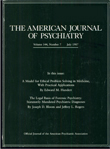Depressive Symptoms in the Early Course of Schizophrenia: Relationship to Familial Psychiatric Illness
Abstract
OBJECTIVE: This study examined the relation between the presence of depressive symptoms in schizophrenic patients with a recent first psychotic episode and affective disorders among their relatives. METHOD: Data on depressive symptoms in 70 patients with schizophrenia diagnosed according to the DSM-III-R criteria, who had had a recent first psychotic episode, and psychiatric diagnostic information on 293 of their first-degree and 674 of their second-degree relatives were collected. Depressive symptoms in the schizophrenic probands were examined at the index psychotic episode (at study entry) and systematically over a 1-year follow-through period. The majority of first-degree family members were interviewed in person with the use of semistructured diagnostic interviews. RESULTS: The linear regression findings confirmed the hypothesis that depressive symptoms in the early course of schizophrenia are associated with a family history of unipolar affective illness. CONCLUSIONS: Because depression in the patients was associated with a family history of depression, this suggests that depression in schizophrenia is not solely either a reaction to having had a psychotic episode or part of the recovery process. The findings are consistent with a model in which a familial genetic liability to affective disorder, when present, is viewed as exerting a modifying influence on the patient's schizophrenic illness to increase expression of depressive symptoms. (Am J Psychiatry 1997; 154:1551–1556)



